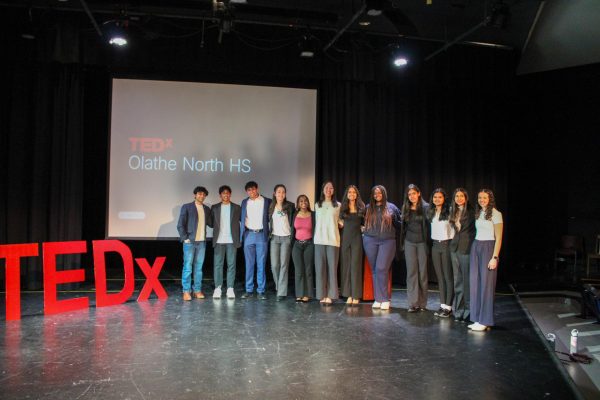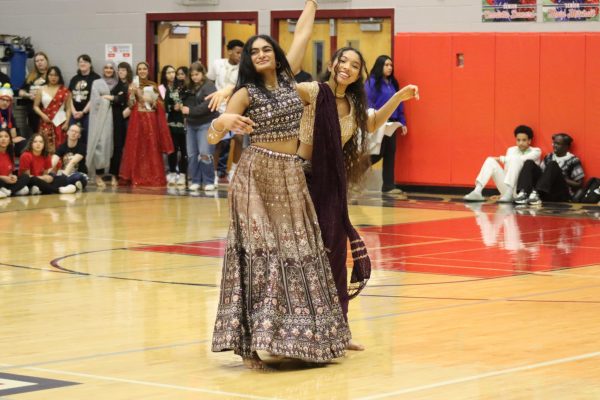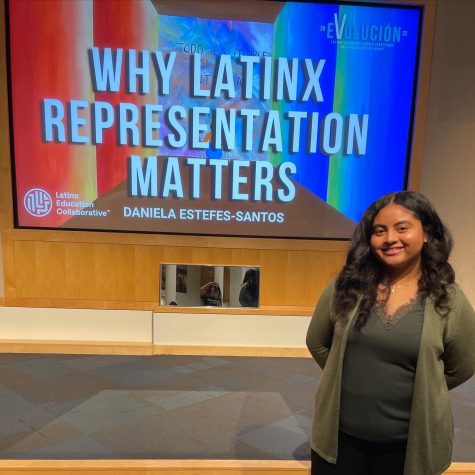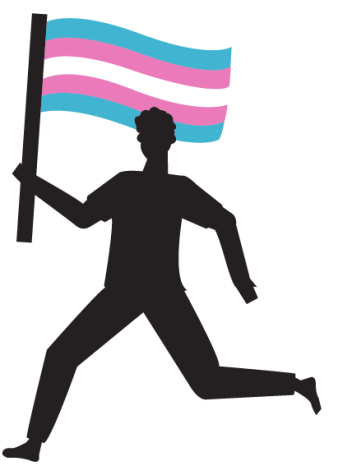Shining a Light on Diversity
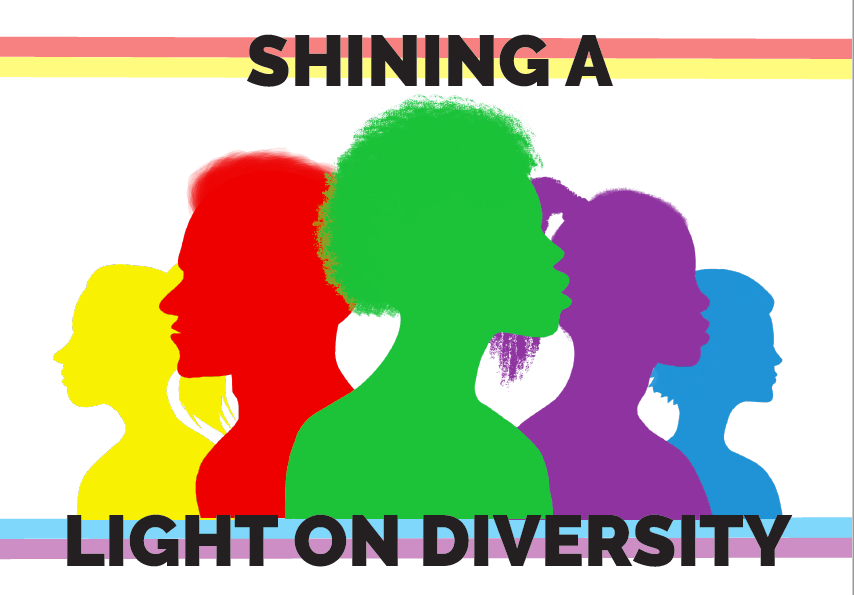
Students in the Olathe School District, namely the Olathe North Student Diversity Council, have been speaking up about recent racially motivated events within Olathe Schools that have taken social media by storm, including a homecoming proposal.
Two students from Olathe South High School went viral after sharing a picture of themselves with a homecoming proposal sign that said, “If I was Black, I would be picking cotton, but I’m white so I’m picking you for HOCO?” Students were outraged about the sign.
“I think it’s disgusting that people could even think it was remotely funny,” sophomore Jimena Saldivar said. “I think the student in the photo who attends Olathe South should be expelled or long term suspended.”
Other students were just as passionate as Saldivar.
“It was super shocking considering I see Olathe Schools as being a much more tolerant place,” sophomore Camryn Ronning said. “I can only imagine how that affected the Black students around Olathe.”
In regards to the sign, Olathe superintendent Brent Yeager released a statement addressed to the Olathe Public Schools Community, stating that the event saddened him and he hopes that the district will learn from it.
“I hope he holds true to [the statement],” junior Emory Morgan said. “I hope he continues to work on creating a safe and inclusive environment for all students.”
Students also stated how they feel the district should handle situations involving racism.
“The school district needs to be more real with how it addresses the racism and discrimination that happens in schools, from microaggressions to blatant racism,” junior Kunmi Faseru said. “Teachers and staff aren’t exempt from the education that needs to be had when it comes to racial and cultural sensitivity. Everybody needs to start doing their part in calling out insensitive and racist actions and comments.”
In addition, Yeager also hosted an event, named “Talk with the Superintendent,” that allowed students within the district to talk to him about their views on how to make the Olathe School District more inclusive. This event was hosted at the Industrial Resource Center on October 15th and hosted students from all Olathe high schools, including Olathe Virtual School and Mill Creek Campus.
“I thought that attending the event would be an interesting and insightful experience. I wanted to get the information about what the district was planning on doing from the direct source,” junior Joey Wiltanger said. “Transparency is a great policy for the district to be adopting, especially as these issues are being brought into the spotlight.”
Wiltanger was one of several students representing Olathe North at the event and is looking forward to meeting with the superintendent again.
“I liked that students were given a voice directly to the high-up people in the district,” Wiltanger said. “These events, or something like it, should happen more.”
Yeager announced on December 1st that there would be another opportunity for discussion, titled “Student Conversation with the Superintendent,” on December 8th at the Mill Creek Campus.
In response to statements made by school board candidate Jennifer Gilmore, claiming that certain books should be banned from Olathe classrooms, the Olathe North Student Diversity Council met up with the Olathe East Young Allies organization to support three Olathe East Students speaking during the public comments section of the October Olathe School Board meeting. Olathe East students Jylon Hollinshed, David Bishop, and Komal Kaur spoke about their experiences as POC students in the district, how that affects their learning, and how they feel the curriculum in the district should look.
“As a proud Punjabi and Sikh daughter of immigrants, I want to see myself reflected in different literature,” Kaur said. “In public schools, you shouldn’t be prohibiting books based on their content.”
This statement, and the statements of the other two students, was sparked by recent content posted by Gilmore on her Facebook account. Gilmore took to the platform after reading a scene from the book All Boys Aren’t Blue, a memoir by a Black queer individual, and claimed that the novel was “pornographic” and did not contain “appropriate language for children.”
“I would guarantee you that if I took this book to a board meeting, I could not read it out loud,” Gilmore said in a Facebook video, “They would shut down the meeting.”
Gilmore’s statement elicited negative response from students throughout the district. It also sparked a larger conversation about diverse education throughout all classes.
“As a school district that promotes diversity and inclusion,” Bishop said, “We as a community are calling on you in our moment of crisis to act accordingly as a school board. Do not disregard our need for social and racial equality within our schools.”
Students from North also put in their opinion on diversity in the current curriculum.
“Sensitive topics such as ethnic genocide and slavery need to be approached with much more care in classrooms, particularly history classrooms. Students of these cultures are still affected by hearing of these events and hearing it be carelessly joked about or incorrectly presented is harmful,” said Faseru. “Rather than focusing on ‘increasing’ the diversity that already exists within some schools, the district should put effort into accommodating the diverse student groups and making it a safe space for them, making curriculum and discussions safe for them.”
Teachers also shared their experiences with sensitive topics and diversity in the classroom and how they handle discussion about them.
“When it is time to talk about sensitive topics I try to be as transparent with my students as possible,” history teacher Adrian Martinez said. “These events happened, just because they are sensitive topics doesn’t mean we should not cover them. I let my students know exactly what they are about to see or hear, and allow them to excuse themselves if they need a break from what we are covering.”
Martinez also addressed curriculum in history classes and how he thinks it could potentially be improved.
“I think we need to add more perspectives and viewpoints from people of color in our history courses. Women as well,” Martinez said. “Too often are we shown the ‘white male perspective,’ and although white men have greatly contributed to this country, they are not the only ones.”
Martinez additionally addressed his goal for his students and what he wishes for them to take away from his class.
“I want my students to know both the good and bad things that have happened throughout history so they can make a change and do their part in ensuring the bad parts don’t repeat themselves,” said Martinez. “I think the truth gets misinterpreted on some of the events in our country’s history because we are afraid to talk about these topics, but it is our job to tell all sides of history.”
History teacher Brent Schulte had a similar view on teaching sensitive topics.
“I always want my students to know why these things happened. So much focus gets put on the violence and suffering of the victims, which is critically important to remember, but having a deeper, contextual understanding of the causes & motivations of these events is equally important,” Schulte said. “I think it’s easy for students to look at extreme situations like the holocaust and think ‘that could never happen today,’ but unless we have a nuanced understanding of why it happened, we won’t be able to recognize the trends and patterns that could lead to another tragic and extreme situation.”
English teacher Deirdre Zongker also commented on her experience with diverse voices in literature within English classes.
“I think that ON English teachers have been working on increasing the diversity of our texts for the past several years,” Zongker said. “The ELA department has spent thousands of dollars buying new books that represent a variety of authors, characters, and experiences, so I feel very confident that the ELA classes at ON are very diverse.”
Zongker also shared her thoughts on banning books within the district.
“I don’t think we should have ‘banned’ books, but I do agree that some things are inappropriate. This is the world we live in, and we should be teaching students to navigate this world through the literature we teach,” said Zongker. “If sex, drugs, or violence is in a book to serve an artistic purpose – to get a message across or depict realistic conflicts and issues students face – then I think it should be allowed, especially at the higher grades.”
At the board meeting, Hollinshed argued on behalf of a diverse curriculum.
“What makes us so undeserving of learning about our history or reading literature that is a reflection of our own experiences?” Hollinshed said. “Especially when we have had to sit through year after year of in-depth analysis of every white figure in America. We aren’t trying to diminish the voice and experience of the majority, but we want to amplify the voices of the minority.”

Mallory is a senior and this is her second year on the paper. Her favorite part of newspaper is being able to write about a lot of different topics, especially...

